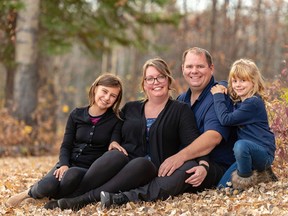The following story was published last week in the Vancouver Sun. It speaks to the challenges many families have to face who live in rural and remote locations in our province that need to seek care. I have been hearing these types of stories from all over BC and many people who have shared with me don’t want their private experiences shared publicly but I can assure you that many similar untold accounts of hardship exist throughout rural BC. I write this preamble as I believe we must champion equity for all. I thank the Thompson family for allowing their story to be shared and I hope them all the best in their treatment and recovery. – Paul Adams – Executive Director – BC Rural Health Network.
A B.C. couple estimate they’ve spent more than $10,000 driving back-and-forth from their home in Fort Nelson for cancer care
Author of the article:
Published May 24, 2023
In the nearly two years since Jamie Thompson first found a lump in her breast that was later diagnosed as cancer, the Fort Nelson mother estimates she and her husband Ron have spent more than $10,000 driving to-and-from their home to Dawson Creek and Fort St. John for cancer treatments.
In addition to spending hundreds-of-dollars in gas for the four-to-five-hour drive, they’ve spent hundreds more for hotel stays. Ron, a mechanic, has forfeited thousands in lost wages. It also means days away from their nine- and 13-year-old daughters.
So when Jamie and Ron heard that the B.C. government would be covering the travel and accommodation costs of prostate and breast cancer patients who will receive radiation treatment at one of two clinics in Bellingham, Wash., starting May 29, they felt left behind.
“There’s jealousy and anger,” Jamie said. “But at the same time, not surprised or shocked,” she added, because residents of northern B.C. are used to inequities when it comes to health-care access.
“Having cancer is stressful,” said the 38-year-old who works at a health food store. “I’m trying to live, I got two daughters. Like this is crazy stress on my own brain and body. So then you add the financial aspect to it and it goes like over the top.”
“It makes you mad just that there’s no help,” Ron said. “And then you hear, ‘Oh, we’re gonna send people across the border because it’s right there and we’re gonna pay their costs and stuff like that.’ Like, the people up here need help.”
The move to send up to 4,800 B.C. patients to the U.S. over the next two years is an attempt to address the backlog in B.C., which has one of the longest waits for radiation treatment in Canada. The province will cover all costs related to travel and accommodation, including paying for a support person to accompany the patient.
Jamie’s radiation therapy will start in July in Prince George, an eight-hour drive south, which will keep her away from home for six weeks. She said she would be willing to go to Bellingham for treatment if it was an option.
“Of course I’d be willing to travel because right now I’m paying everything out-of-pocket. I don’t care how far I have to go.”

Asked who will be selected to travel to Washington state, B.C. Cancer chief medical officer Dr. Kim Nguyen Chi told Postmedia News last week that the cancer agency will be targeting breast and prostate cancer patients who can receive radiation therapy over five consecutive days to limit the time away from home. Patients will also be triaged based on how long they’ve been waiting for treatment.
B.C. United MLA Tom Shypitka, who represents the riding of Kootenay East, said there’s been no transparency as to who will be selected for treatment in Bellingham.
“How are they picking the winners and losers?” he asked. “I’m gonna guess it’s not heavily weighted (to patients) from the Kootenays. I’m going to take that wild guess it’s going to be a lot of people from Surrey and from the Lower Mainland. We’re just left out in the woods here. We’re basically all alone and it doesn’t feel good.”
Shypitka is frustrated that the B.C. NDP government didn’t negotiate a cross-border treatment option with Alberta, considering the proximity between Interior residents and the neighbouring province.
Chi told Postmedia News last week: “I made some inquiries and we made inquiries to Alberta but … other provinces are … they’re also facing constraints. It’d be great to stay within Canada, but at the same time going to Bellingham is also much closer for people in B.C., particularly in the Fraser Valley.”
However, a spokesperson for Alberta Health on Wednesday said “there have been no conversations on this issue to date.”
Asked last week why the province didn’t opt to send patients to Alberta, Health Minister Adrian Dix said: “We serve way more Albertans than they serve British Columbians.”
Sending people to the U.S. is also a more expensive option. It will cost the province $12,277 for a patient receiving five fractions of radiation therapy compared with $3,854 in B.C., not including travel and accommodation, according to the Health Ministry.
“To add insult to injury, the B.C. taxpayer is picking up the dime for this transportation down to Bellingham, for the treatment, for an assistant or a caregiver to go along with them, all to support private health care down in the States,” Shypitka said.
Paul Adams, executive director of the B.C. Rural Health Network, which advocates for improved health care in rural parts of the province, said he often hears stories like the Thompsons’, families who dry up their savings just to pay for necessary health services.
The B.C. NDP have still not fulfilled their 2020 election promise to open a cancer care centre in Kamloops, Adams said.
“We have one oncology centre (in Prince George) providing radiation for the entire northern portion of the province.”





